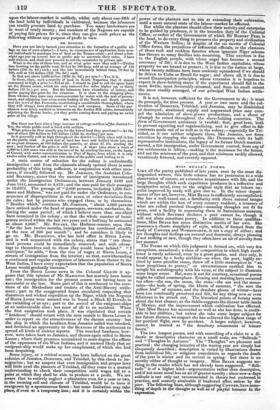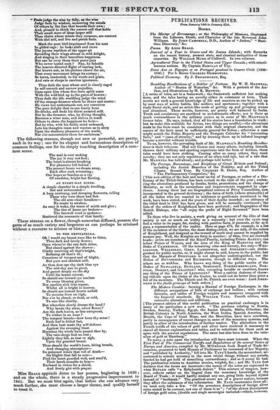MISS BEALE'S POEMS.
LIKE all the poetry published of late years, even by the most dis- tinguished writers, this little volume has no pretension to a wide observation of nature, an extensive acquaintance with life, and the large thoughts which such experience produces in a reflective and imaginative mind, even to the original style that an inborn im- pulse improved by study will give rise to. In the minor depart- ments of her art, however, Miss BEALE is sufficiently accomplished. She has a well-tuned ear, a familiarity with those natural images which are within the ken of every country resident, a treasury of what are called poetical thoughts—meaning thoughts not fit for prose, and a facility in expressing them in harmonious measure, without which SouxuEr declares a poet cannot be, though it will not alone constitute poetry. In addition to these qualifica- tions, Miss BEALE has some distinctive merits of her own. She possesses a chaste simplicity of style, which, if formed from the study of COWPER and WORDSWORTH, is not a copy of either; and her thoughts and feelings are natural and domestic, always pleasing if not striking or new, though they often have an air of novelty from her manner.
The Poems on which this judgment is formed are, with very few exceptions, occasional; a class of composition in which high excel- lence is rarely achieved, even by a great genius, and then only, it would appear, by a lucky accident—as when the poet, highly ex- cited by some peculiar cause, threw off a little masterpiece in "an hour propitious to poetry," or circumstances enabled him to mingle his autobiography with his verse, or the subject to illustrate some larger event. But, were it not for courtesy, occasional poems might be called commonplace. Evening and morning have occurred too often—the sun, the moon, the stars—the sea and the moun- tains—the buds of spring, the bloom of summer, " the sere the yellow leaf" of autumn, and the desolate gloom of winter—have been too continually perceived and felt, for any thing new or even felicitous to be struck out. The historical points of botany seem about the best chance; as the dahlia suggests the distant table-lands of Mexico, and the improvement which cultivation has effected. That Miss BEALE has succeeded so well as she has done, is credit- able to her abilities ; but unless she take some larger subject for her future themes, we suspect she has achieved the highest range of her poetical flight, save by accident. A larger subject, however, cannot be treated as " the desultory amusement of leisure hours."
The two longest poems, and with something of a claim to a di- dactic or descriptive character on a small scale, are "Solitude" and "Thoughts in Autumn." The "Thoughts" are pleasant and poetical : the changing beauties of the waning year are simply but eloquently described; description is varied by illustrations drawn from individual life, or religious consolation as regards the death of the year in winter and its revival in spring: but there is no novelty either of thought or imagery. Miss BEALE suggests no- thing to the reader which has not already been suggested. " Soli- tude " is of a higher kind—argumentative rather than descriptive, and if not more novel has an air of greater novelty ; since now-a-days solitude is not only not recommended in theory but eschewed in practice, and scarcely attainable if hankered after, unless by the poor. The following lines, although suggesting COWPER, have some- thing of depth in the thought as well as of playful humour in the
expression. . ,
" Fools judge the wise by fony, as the wires Judge fools by wisdom, measuring the minds Of others by the line that bounds their own; And, pleased to think the narrow cell that holds Their small store of ideas larger still Than theirs whose minds they measure, are content With idol self, and live and perish fools.
Mark the poor bird imprisoned from his nest In gilded cage: he looks aloft and views The joyous warblers of the upper air Spreading their wings abroad in wild delight, And singing in their boundless happiness. But can he envy them their purer joys Who never tasted such ? Nay, he beholds The heaven-directed flight of soaring lark, But knows not, as his pinions cleave the air, That every movement brings its ecstasy; So turns, contented, to his weeds and grain, And eats or sleeps in careless ignorance.
Thus doth the man whose soul is closely caged In self-conceit and narrow prejudice, Gaze upon him whose free-born spirit soars With the wild bird up to the gates of heaven : Thus doth the idle worldling judge the mind Of the strange dreamer whom he shuns and scorns : He views but understands not, nor conceives The pure delight that in one lonely hour He drinks, and finds his thirst unsated still.
Not he the dreamer, who, by diving thought, Becomes a wiser man, and strives to teach
Others to share the happiness he feels—
But he who, with his feeble mind unbraced, Lets his thoughts roam and wanton as in sleep Upon the shadowy pleasures of the world, Nor e'er concentrates them for usefulness."
The following stanzas, though not new or powerful, are pretty, each in its way ; one for its elegant and harmonious description of common feelings, one for its simply touching description of a com- mon scene.
The soul is ever seeking The joy it may not find ; The heart is almost breaking For pleasures left behind : The present hours we dream away, Each after each retreating; Our hopes as baseless as a ray Of sunshine, bright but fleeting.
AN EVERY-DAY SCENE.
A simple chamber in a simple dwelling,
Sad and untenanted—
A harp unstrung, and drooping flowerets, telling Those who were there had fled.
The old arm-chair forsaken—
No music to awaken, As once it woke, the tones of mirth and glee ;
The ties of home are broken— The farewell word is spoken—
Scattered the remnants of that family.
These stanzas on a flower, though somewhat diffused, possess the germ of as much variety and largeness as can perhaps be attained without a recourse to science or history.
TO THE GENTIANELLA.
Oh! would my breast were like to thine, Thou dark and lovely flower; Open whene'er the sun cloth shine, But closed against the shower : Gladly receiving all that's bright, Refusing all that's ill ; Conscious of tempest and of blight, But pure and shielded still.
As thou dost ope thy dark blue eye The mid-day sun to greet, And gazest deeply on the sky Until his beams retreat, So should our inward eye unclose To every blessing given, Nor careless sink into repose, Whilst all is bright in heaven. So should our inmost hearts unfold To mercies from on high, Nor e'er he closed, or dead, or cold, To sun-like charity.
But wherefore slowly droops thy head ? Why bends thy stem, sweet flower ? Are the dark leaves, so late outspread, To wither in an hour ?
The tempest broods—how keen thy sense !
Each leaf is folded fast, And thou haat made thy self-defence Against the sweeping blast. Harmless the winds have passed thee by, The rain-drops find no rest ; Lightly they fall, as tear or sigh, Upon thy guarded breast.
Thus should the world's keen, biting breath,
And changing atmosphere— Its poisoned winds that tell of death— Its blights that fall to sere—
Find the heart guarded well, and steed,
Their harsh assaults to bear—
Enclosed in virtue for a shield, And firmly girt with prayer.
Miss BEALE apiien s dates to her poems, beginning in 1836; and on the whole, there is a steady progressive improvement to 1841. But we must hint again, that before she can advance very much further, she must choose a larger theme, and qualify herself to treat it.



























 Previous page
Previous page